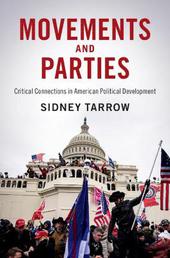
|
Movements and Parties: Critical Connections in American Political Development
Paperback / softback
Main Details
| Title |
Movements and Parties: Critical Connections in American Political Development
|
| Authors and Contributors |
By (author) Sidney Tarrow
|
| Series | Cambridge Studies in Contentious Politics |
|---|
| Physical Properties |
| Format:Paperback / softback | | Pages:288 | | Dimensions(mm): Height 227,Width 152 |
|
| ISBN/Barcode |
9781009013963
|
| Classifications | Dewey:323.0420973 |
|---|
| Audience | | Tertiary Education (US: College) | | Professional & Vocational | |
|---|
| Illustrations |
Worked examples or Exercises
|
|
Publishing Details |
| Publisher |
Cambridge University Press
|
| Imprint |
Cambridge University Press
|
| Publication Date |
26 August 2021 |
| Publication Country |
United Kingdom
|
Description
How do social movements intersect with the agendas of mainstream political parties? When they are integrated with parties, are they coopted? Or are they more radically transformative? Examining major episodes of contention in American politics - from the Civil War era to the women's rights and civil rights movements to the Tea Party and Trumpism today - Sidney Tarrow tackles these questions and provides a new account of how the interactions between movements and parties have been transformed over the course of American history. He shows that the relationships between movements and parties have been central to American democratization - at times expanding it and at times threatening its future. Today, movement politics have become more widespread as the parties have become weaker. The future of American democracy hangs in the balance.
Author Biography
Sidney Tarrow is Emeritus Maxwell M. Upson Professor of Government at Cornell University and Adjunct Professor at the Cornell Law School. His recent books include Power in Movement, 3rd ed (2011), War, States, and Contention (2015), and The Resistance: The Dawn of the Anti-Trump Opposition Movement (co-edited with David S. Meyer, 2018).
Reviews'In this trailblazing synthesis, one of the great scholars of 'contentious politics' sweeps across American history to unpack the complex interactions of political movements and political parties. Tarrow uncovers relationships that are highly variable, always fraught, and quite likely to determine the future course of American democracy. His assessment of how these engagements have changed over time offers a powerful, sobering commentary on the current critical juncture in American political development.' Stephen Skowronek, Yale University, Connecticut 'Parties and voters connected by a verb: engage, mobilize, turn out, suppress. In the place of this conventional approach to electoral politics, Sid Tarrow provides a sweeping historical account of how social movements have challenged and disrupted the American party system. Organized outside the party system, citizens and activists demand change, organize voters, and displace established strategies with innovative practices. Tarrow makes a compelling case for the consequential contentiousness of institutional politics. Elisabeth S. Clemens, University of Chicago 'The shocking invasion of the capital last January 6th exposed the combustible confluence of movements and parties that currently disrupts politics in the United States. Movements and Parties, written by the foremost scholar of social movements, makes clear that the insurrection to overturn the 2020 presidential election, extraordinary as it was, drew on political forces that have long disrupted the nation. Masterfully integrating sophisticated theoretical insights and rich historical narrative, Sidney Tarrow illuminates the critical but under examined relationship between social activism and institutions - weaving a fascinating tale of insurgents and party leaders animating foundational struggles over American identity from the formative alliance between Republicans and abolitionists of the 1850s to the incursion of a 'social movement society' on contemporary party politics. A must read for anyone who wants to understand the role of movements and parties in the challenges that await American democracy.' Sidney M. Milkis, University of Virginia
|